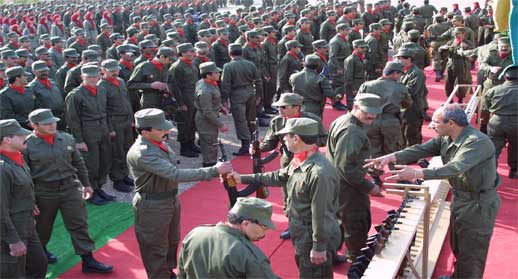| Following the removal of terrorist label from MKO members and also the removal of Ashraf bars from their bodies and minds, they are more likely to find a way out of the Cult of Rajavi on the grand of provided legal opportunities. |
 The Mujahedin Khalq Organization was first placed in the list of “Foreign Terrorist Organizations” after the list was created in 1997 because of its alliance with Saddam Hussein and the assassination campaign it launched against American civilians and military personnel working in Iran in the 1970s. Although designated as a Foreign Terrorist Organization, the MKO’s lobbying campaign was highly active in US Congress and Administration. [1]
The Mujahedin Khalq Organization was first placed in the list of “Foreign Terrorist Organizations” after the list was created in 1997 because of its alliance with Saddam Hussein and the assassination campaign it launched against American civilians and military personnel working in Iran in the 1970s. Although designated as a Foreign Terrorist Organization, the MKO’s lobbying campaign was highly active in US Congress and Administration. [1]
There have been numerous reports on American support for the MKO during the years it was considered a terrorist group. The peak of US sponsorship for the group was revealed by Seymour Hersh’s piece on New Yorker,” Our Men in Iran”. The report exposed that the MKO militants were trained by the US Joint Special Operation Command in Nevada. [2]
Practically the MKO’s designation as a terrorist organization, did not affect its functions in the international community so much. Nor it affected the group’s internal Cult-like relations.
In September2012, the US State Department decided to remove the MKO from the FTO list. The delisting was announced while the State Department emphasized that it “doesn’t overlook or forget the MEK’s past acts of terrorism including its involvement in the killing of US citizens in Iran in the 1970s and an attack on US soil in 1992.” The statement read, “The Department also has serious concerns about the MEK as an organization, particularly with regard to allegations of abuse committed against its own members". [3]
Actually, the DOS’s concerns about human rights violations committed by the leaders of the cult-like MKO have never prevented the group from its lobbying efforts in the US Congress whether it is listed or delisted. Furthermore, the group’s terrorist designation had no impact on its cult-like practices and its violent behavior against dissident members inside the group.
Once the MKO is delisted, its neo-con supporters will simply more freely support the group although the removal from the list will have no substantial impact on the group’s external functions.
The other crucial change for the MKO was its removal from Camp Ashraf its three-decade home -- granted by Saddam Hussein-- in Iraq. Following the Memorandum of Understanding signed by the UN Assistance Mission in Iraq and the Government of Iraq,[4]the MKO was supposed to evacuate Camp Ashraf by the end of 2012.The evacuation process was almost completely accomplished. The Camp residents were transferred to Camp Liberty, a former US base near Baghdad airport.
The removal from Camp Ashraf was an influential phase in the four-decade life of the organization. It significantly affected the group’s internal relations.
Temporary Transit Location (TTL/ Liberty) is guarded by Iraqi Police which has installed several stations in the base. The MKO’s base is no more an isolated, fenced and barbed piece of land in the desert. It is located in the neighborhood of Baghdad where a Shiite government, with friendly relationship with Islamic Republic is ruling.
The camp is also monitored by the UN representatives. Now, the leaders of the MKO have to work harder to maintain the integration of the cult. They have increased cult-like pressure and organizational control over members to prohibit the collapse of their establishment. Members, who have recently fled the TTL, described the severe mind control schedule imposed there right now. Majid Mohammadi is a former MKO member who left Liberty in May 2012. He believes that moving to the new camp has raised the members’ spirits. Therefore, ”the cult leaders had to increase their control over members so that they can maintain the cult relations and structures”, he said in an interview.”They seriously fear members talking to each other”. Moving to TTL has narrowed the leaders’ influence over the forces although they have extended their mind control meetings up to "12 hours a day". [4]
On the other hand, far from the Iranian border, the MKO operatives have almost lost the capacity to launch terrorist acts or to dispatch teams across Iran-Iraq border.
Following the removal of terrorist label from MKO members and also the removal of Ashraf bars from their bodies and minds, they are more likely to find a way out of the Cult of Rajavi on the grand of provided legal opportunities. They can seek asylum in third countries or return to Iran by the aid of UNHCR and the GOI. The eventual collapse of the cult is not so far. The impact of the MKO delisting on the group’s external functions is not really as much as the impact of Ashraf evacuation on the group’s internal functions.
By Mazda Parsi
References:
[1]Sahimi, Mohammad, Don’t Remove the MEK From the Terrorist List, Antiwar.com, July 6th 2011
[2]Hersh, Seymour, Our Men in Iran, the NewYorker, April 6th, 2012
[3]US Department of State, Delisting of the Mujahedin-e Khalq, Office of the Spokesperson, September 28, 2012
[4] http://www.nejatngo.org/en/post.aspx?id=4900
